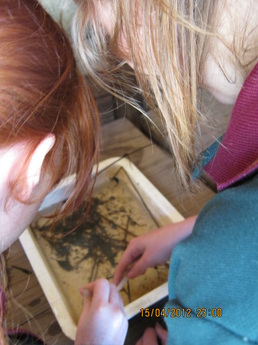Middle School

Sampling macroinvertebrates
This exciting facility can offer authentic and engaging learning opportunities for any learning area. At the wetland, students can participate in hands-on activities from water testing without water, to ecology activities and macroinvertebrate identification. The Urrbrae Wetlands provides a unique setting for students to develop and apply inquiry based learning skills. Alternatively, you can use the tranquil surroundings and diversity of plants and animals to inspire you class.
Below are a number of concepts that can be brought to life at the wetland but there are many, many more.
The SciencesExperimental design
- the scientific method
Popluation / habitat surveys
- habitat variations
Adaptations and survival
Classification - using a dichotomous key - designing your own dichotomous key |
Society and EnvironmentImportance of wetlands
- how they function - urban wetlands
Indigenous use of plants
Habitat changes and their impacts
- threatened species Human impacts on ecosystems - catchment issues - storm water management - pollution and trash surveys - urbanisation - soil as a resource Natural vs Man-made wetlands The water cycle - ground water - catchments Mapping |
MathsCollecting and recording data
- manipulationf statistics - categorising and classifying Symmetry in nature - the golden ratio Measurment - area & volume - estimating Geometric reasoning The Arts - Photography - Short films - Observationsal drawing, painting - Bush art and MANY MORE | ||||||||||||||||||||||||||||||
Images contained on some of these worksheets are courtesy of NRM Education.
More resources and activities can be found on their website http://www.nrmeducation.net.au/
More resources and activities can be found on their website http://www.nrmeducation.net.au/
To discuss how you could explore some of these ideas or another area of your curriculum simply call the Wetland Manager and start creating a unique learning oppertunity that is tailored to your needs.
